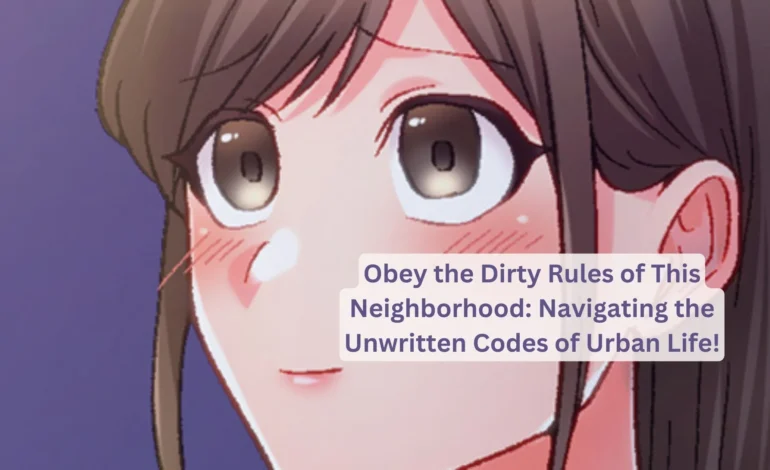
Obey the Dirty Rules of This Neighborhood: Navigating the Unwritten Codes of Urban Life!
In the complex tapestry of urban living, neighbourhoods often develop their own sets of informal rules and norms. These unwritten guidelines, sometimes referred to as the “dirty rules,” dictate the ebb and flow of daily interactions and societal expectations within a community.
The term “dirty rules” refers to the informal, often unspoken guidelines that govern behaviour within a neighbourhood. Unlike formal laws or regulations, these rules are not codified or officially recognized.
This article explores the intricacies of these informal codes, providing insights into their origins, impact, and strategies for navigating them effectively.
Table of Contents
What is obey the dirty rules of this neighborhood? – informal agreements about conflict resolution!
In many neighbourhoods, especially those where formal dispute resolution mechanisms are lacking or ineffective, residents often turn to informal agreements to manage and resolve conflicts. These “dirty rules” are not documented in any official capacity but emerge from the social interactions and mutual understandings that develop among community members. Such informal agreements might involve unwritten protocols for handling disputes, sharing resources, or maintaining order.
For instance, neighbours might establish an unofficial system for mediating arguments where respected figures in the community serve as arbitrators, leveraging their influence and understanding of local dynamics. This system helps in swiftly addressing conflicts, often relying on the principle of reciprocity and social pressure rather than legal enforcement.
The reliance on these informal agreements highlights the adaptability and resilience of community networks in managing internal issues. When a dispute arises, residents may engage in negotiations or concessions based on these unwritten rules, aiming to avoid escalation and maintain harmony.
These practices can involve compromises that are not codified in any legal document but are respected due to social norms and mutual expectations. Such agreements are often pragmatic, reflecting the unique needs and values of the community, and they function to preserve relationships and foster a sense of cohesion among residents. By adhering to these dirty rules, individuals navigate conflicts with a shared understanding of how disputes should be resolved, balancing personal interests with the broader goal of community stability.
The Origins of Dirty Rules:
Dirty rules often arise in environments where formal systems of governance are either absent or ineffective. Historically, neighbourhoods have relied on their informal systems to manage daily life and resolve disputes. This reliance on unwritten rules can be traced back to traditional societies where communal norms played a crucial role in maintaining order.
In modern urban settings, these rules continue to evolve, influenced by various factors including historical conflicts, social hierarchies, and economic conditions. For example, in a neighbourhood with a history of economic hardship, residents might develop informal agreements to share resources or support one another in times of need.
Common Examples of Dirty Rules – depending on the specific dynamics!
Turf Wars:
Turf wars refer to disputes between residents or groups over control of certain areas within the neighbourhood. In some cases, residents might engage in subtle tactics to assert dominance or protect their interests, such as informal agreements about who gets to use a shared garden or how noise levels are managed.
2. Social Bribery:
Social bribery involves offering favours or small gifts to gain favour or avoid conflict. In neighbourhoods where formal enforcement mechanisms are weak, residents might use social bribery to ensure compliance with certain norms or to secure preferential treatment.
3. Selective Enforcement:
Selective enforcement refers to the uneven application of rules or regulations, often benefiting certain individuals or groups. In some neighbourhoods, those with more influence or resources might receive preferential treatment, while others are held to stricter standards.
Why Dirty Rules Persist – lacking or ineffective!
The persistence of dirty rules can be attributed to a combination of historical, social, and economic factors. These rules often emerge from the need to manage relationships.
Historical Context:
Many dirty rules are rooted in the historical experiences of a neighbourhood. For example, a community that has experienced conflict or instability might develop informal rules as a means of coping with those challenges. These rules can become entrenched over time, shaping the way residents interact and resolve disputes.
Power Dynamics:
Power dynamics play a crucial role in the establishment and enforcement of dirty rules. In neighbourhoods where there are significant disparities in influence and resources, those with more power often can shape or bend the rules to their advantage.
Economic Conditions:
Economic conditions can also contribute to the development of dirty rules. In areas where resources are scarce or economic hardship is prevalent, residents might create informal agreements or practices to help manage limited resources.
Navigating Dirty Rules: Practical Strategies!
Understanding and navigating dirty rules requires a combination of social awareness, strategic thinking, and ethical consideration.
Recognize the Patterns:
The first step in navigating dirty rules is to recognize the patterns of behaviour within the neighbourhood. Pay attention to the actions that are consistently rewarded or punished, as well as the informal agreements or expectations that residents adhere to. Observing these patterns can provide valuable insights into the unwritten rules that govern the community.
Blend In:
Conforming to local norms can help you avoid drawing attention and reduce the likelihood of conflicts. By blending in with the existing social dynamics, you can navigate the neighbourhood more smoothly and build stronger connections with your neighbours.
Build Alliances:
Forming relationships with influential residents can provide protection and support within the neighbourhood. By building alliances with key figures or community leaders, you can gain access to valuable information and resources, as well as secure a degree of favour in navigating the dirty rules.
Stay Informed:
Keeping up with local news and gossip is essential for understanding shifting dynamics within the neighbourhood. Staying informed about changes in social norms or emerging issues can help you adapt your strategies and respond effectively to new developments.
Ethical Considerations – key ethical considerations!
Navigating dirty rules involves balancing personal values with the need to conform to local expectations. It is important to consider the ethical implications of your actions and the long-term impact on your relationships and reputation:
Integrity vs. Survival:
While adapting to local norms is important, maintaining your integrity is equally crucial. Strive to find a balance between conforming to the dirty rules and staying true to your values. Avoid compromising your principles for the sake of survival, and consider how your actions might affect your long-term relationships and reputation within the community.
Long-Term Effects:
Assess the potential long-term effects of complying with dirty rules. Consider how your behaviour might impact your standing within the neighbourhood and the relationships you build with others.Weigh the benefits of conforming against the potential risks and consequences, and strive to make decisions that align with your values and goals.
Urban Neighborhoods:
In urban areas, dirty rules can manifest in various ways. For example, residents might engage in informal agreements with local businesses to avoid certain regulations or negotiate their arrangements for managing shared spaces. In some cases, residents might turn a blind eye to illegal activities in exchange for discounts or other benefits, reflecting the complex interplay of social dynamics and informal governance.
Rural Communities:
In rural settings, dirty rules often involve unspoken agreements about land use or mutual assistance. For instance, neighbours might have informal understandings about how to share resources or provide support during times of difficulty. These rules help residents cope with isolation and limited resources, fostering a sense of community and mutual aid.
FAQs:
What are the “dirty rules” of a neighbourhood?
The “dirty rules” are informal, unwritten guidelines that govern behaviour and conflict resolution within a community. They emerge from social interactions rather than formal regulations.
How do informal agreements help in conflict resolution?
Informal agreements offer a flexible and immediate way to resolve disputes by leveraging mutual understanding and social pressure. They often focus on maintaining harmony rather than strict adherence to formal rules.
Why are these rules considered “dirty”?
These rules are termed “dirty” due to their morally ambiguous or ethically questionable nature, as they often bypass official channels and rely on personal influence and compromise.
Are these informal rules legally binding?
No, informal rules are not legally binding and are based on social norms and mutual agreements rather than formal legal obligations.
How can someone identify these unwritten rules in their neighbourhood?
One can identify these rules by observing patterns in behaviour, listening to local gossip, and noting how conflicts are typically resolved within the community.
Conclusion:
Navigating the “dirty rules” of a neighbourhood involves understanding and adapting to the informal, often unwritten guidelines that influence community dynamics. These rules, while not legally binding, play a crucial role in managing conflicts and maintaining social order. By recognizing these norms and learning to navigate them effectively, individuals can foster better relationships and avoid unnecessary disputes. Ultimately, while these rules may seem ambiguous, they provide a practical framework for resolving conflicts and ensuring harmonious interactions within the community.





